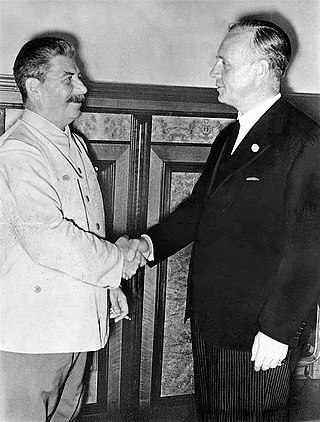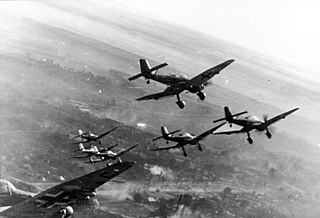Related Research Articles

Gdynia is a city in northern Poland and a seaport on the Baltic Sea coast. With an estimated population of 257 000, it is the 12th-largest city in Poland and the second-largest in the Pomeranian Voivodeship after Gdańsk. Gdynia is part of a conurbation with the spa town of Sopot, the city of Gdańsk, and suburban communities, which together form a metropolitan area called the Tricity (Trójmiasto) with around one million inhabitants.

The Molotov–Ribbentrop Pact, officially the Treaty of Non-Aggression between Germany and the Union of Soviet Socialist Republics, and also known as the Hitler–Stalin Pact and the Nazi–Soviet Pact, was a non-aggression pact between Nazi Germany and the Soviet Union, with a secret protocol establishing Soviet and German spheres of influence across Eastern Europe. The pact was signed in Moscow on 24 August 1939 by Soviet Foreign Minister Vyacheslav Molotov and German Foreign Minister Joachim von Ribbentrop.

World War II or the Second World War was a global conflict between two coalitions: the Allies and the Axis powers. Nearly all the world's countries participated, with many investing all available civilian resources in pursuit of total war. Tanks and aircraft played major roles, enabling the strategic bombing of cities and delivery of the only nuclear weapons ever used in war. World War II was the deadliest conflict in history, resulting in 70 to 85 million deaths, more than half of which were civilians. Millions died in genocides, including the Holocaust, and by massacres, starvation, and disease. After the Allied victory, Germany, Austria, Japan, and Korea were occupied, and German and Japanese leaders were tried for war crimes.

George VI was King of the United Kingdom and the Dominions of the British Commonwealth from 11 December 1936 until his death in 1952. He was also the last Emperor of India from 1936 until the British Raj was dissolved in August 1947, and the first head of the Commonwealth following the London Declaration of 1949.

The Invasion of Poland, also known as the September Campaign, Polish Campaign, and Polish Defensive War of 1939, was a joint attack on the Republic of Poland by Nazi Germany, the Slovak Republic, and the Soviet Union, which marked the beginning of World War II. The German invasion began on 1 September 1939, one week after the signing of the Molotov–Ribbentrop Pact between Germany and the Soviet Union, and one day after the Supreme Soviet of the Soviet Union had approved the pact. One of the aims of the invasion was to divide Polish territory at the end of the operation; Poland was to cease to exist as a country and all Poles were to be exterminated. The Soviets invaded Poland on 17 September. The campaign ended on 6 October with Germany and the Soviet Union dividing and annexing the whole of Poland under the terms of the German–Soviet Frontier Treaty. The invasion is also known in Poland as the September campaign or 1939 defensive war and known in Germany as the Poland campaign.

Wejherowo is a city in Gdańsk Pomerania, northern Poland, with 48,735 inhabitants (2021). It has been the capital of Wejherowo County in Pomeranian Voivodeship since 1999; previously, it was a city in Gdańsk Voivodeship (1975–1998).

Lina Marcela Medina de Jurado is a Peruvian woman who became the youngest confirmed mother in history when she gave birth to son Gerardo on 14 May 1939, aged five years, seven months, and 21 days. Based on the medical assessments of her pregnancy, she was less than five years old when she became pregnant, which was possible due to precocious puberty.

Kościan is a town on the Obra canal in west-central Poland, with a population of 23,952 inhabitants as of June 2014. Situated in the Greater Poland Voivodeship, it is the capital of Kościan County.

The Free City of Danzig was a city-state under the protection and oversight of the League of Nations between 1920 and 1939, consisting of the Baltic Sea port of Danzig and nearly 200 other small localities in the surrounding areas. The polity was created on 15 November 1920 in accordance with the terms of Article 100 of the 1919 Treaty of Versailles after the end of World War I.
Events from the year 1939 in Ireland.
Mohanlal Chaturbhuj Kumhar is an Indian artist. He won the Shilp Guru award in 2003 for his skills in terracotta sculpture. Born in 1939, he is resident of Nathdwara. Kumhar was also awarded the Kalamani for his works in terracotta in 23rd Surajkund Crafts Mela. He has participated in promoting this traditional art in various countries like Spain, USA and Australia. The Government of India awarded him the civilian honour of Padma Shri in 2012.

The National Registration Act 1939 was an Act of Parliament in the United Kingdom. The initial National Registration Bill was introduced to Parliament as an emergency measure at the start of the Second World War.
Events from the year 1939 in France.
Events of the year 1939 in Belgium.